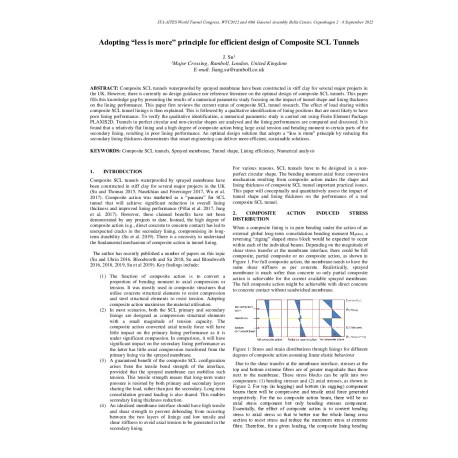Cart
0
0
No document
0,00 €
Total
Document successfully added to your shopping cart
Quantity
Total
There are 0 items in your cart.
There is 1 item in your cart.
Total documents
Total shipping
To be determined
Total
Search & filter
Search for a publication
Search & filter
Adopting less is more principle for efficient design of Composite SCL Tunnels
Adopting_Less_Is_More_Principle_
Composite SCL tunnels waterproofed by sprayed membrane have been constructed in stiff clay for several major projects in the UK. However, there is currently no design guidance nor reference literature on the optimal design of composite SCL tunnels. This paper fills this knowledge gap by presenting the results of a numerical parametric study focusing on the impact of tunnel shape and lining thickness on the lining performance. This paper first reviews the current status of composite SCL tunnel research. The effect of load sharing within composite SCL tunnel linings is then explained. This is followed by a qualitative identification of lining positions that are most likely to have poor lining performance. To verify the qualitative identification, a numerical parametric study is carried out using Finite Element Package PLAXIS2D. Tunnels in perfect circular and non-circular shapes are analysed and the lining performances are compared and discussed. It is found that a relatively flat lining and a high degree of composite action bring large axial tension and bending moment to certain parts of the secondary lining, resulting in poor lining performance. An optimal design solution that adopts a “less is more” principle by reducing the secondary lining thickness demonstrates that smart engineering can deliver more efficient, sustainable solutions.




